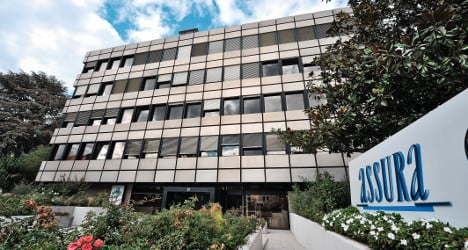The news means that those on a 300 franc franchise with accident cover will pay an extra 16 francs a month.
However rises in premiums will, as ever, vary across the country, with some cantons facing an average eight percent rise.
People in the canton of Neuchâtel face the biggest rise, of 8.2 percent, followed by those in Jura (7.4 percent) and Nidwald (5.4 percent).
Residents of Appenzell will be hoping they are the right side of the medical border – those in Appenzell Innerrhoden face the lowest rise, of 2.2 percent, while people in its neighbour Appenzell Ausserrhoden will have to pay 5.4 percent more.
Eleven cantons will see their health insurance rise by between four and five percent, including Vaud, Valais, Fribourg, Lucerne, Geneva and Ticino.
In ten other cantons, including Zurich and Bern, residents will see a lower than average rise.
Since the law on compulsory health insurance, called LaMal, came into force in 1996 the average standard premium has risen by 4.6 percent a year, said the health office, taking monthly payments from 173 francs in 1996 to 428 francs next year.
The around 60 health insurers in Switzerland’s all-private system set their premiums annually, with figures approved by the federal government.
On revealing the 2016 figures in a press conference in Bern, health minister Alain Berset said the government would react to stop the continued rises but called for patience, reported news agency ATS.
“There is a need to react politically,” he said. “Where possible, we will do something.”
He cited the government’s 2012 action to reduce the price of 1,500 medicines, saving 600 million francs.
“That had a braking effect on premiums,” he said.
However the plan took three years to implement, he noted, pleading for patience on further initiatives.
The principal reasons for continued rises, not least the aging of the baby-boom generation, won’t disappear, he added.
“Premiums are simply a reflection of the costs of health,” said Berset.
Some disagreed, however. Cantonal authorities in Neuchatel, facing a rise that’s twice the national average and the biggest ever experienced by the canton, called on the federal government to give some control over insurance back to the public, said ATS.
The predicted rises are totally disproportionate from one insurer to another, said cantonal authorities.
What’s more, insurance companies’ justification for the rises is “totally incoherent and not legitimately documented by certain insurers,” reported ATS.
Michel Thentz, health minister in the canton of Jura, facing the second highest increase in the country, said “such a rise is not justifiable or bearable. There’s a distortion between reality and the premiums imposed by insurers,” he told ATS.
Criticism was also thrown at insurance company Assura, to date known for its relatively low premiums, which is now imposing the biggest rise of any insurer, of 9.3 percent on average.
The increase could have been more. Last week the media predicted a 14-17 percent rise, leading to emergency discussions between Assura and the federal health office.
Assura, based in Pully in the canton of Vaud, hasn't raised its premiums for four years.
According to some politicians, several insurers held their premiums down last year while awaiting the September 2014 referendum on the scrapping of Switzerland’s all-private health insurance system in favour of a publicly-run scheme, a plan that was rejected by 62 percent of the electorate.
In a statement, Assura said that it attracted 150,000 additional customers in 2014 and that higher costs have led to the rise in 2016 premiums.
However despite the rise, its premiums still remain ten percent lower than the national average, it said.
But some remain unconvinced.
“We haven’t received any convincing explanation for Assura’s increase,” Vaud socialist councillor Pierre-Yves Maillard told ATS.
“But I recognize that, for once, the intervention of federal authorities has had an effect, with the rise reduced by a third. But it remains a very high increase,” added Maillard.
Insurance companies have until the end of October to tell their clients about next year’s premiums.
Customers then have until the end of November to change their insurance, if they wish.
The comparison site priminfo.ch has details of all Swiss health insurance premiums.
Basic health insurance is compulsory for anyone living in Switzerland.



 Please whitelist us to continue reading.
Please whitelist us to continue reading.
Member comments